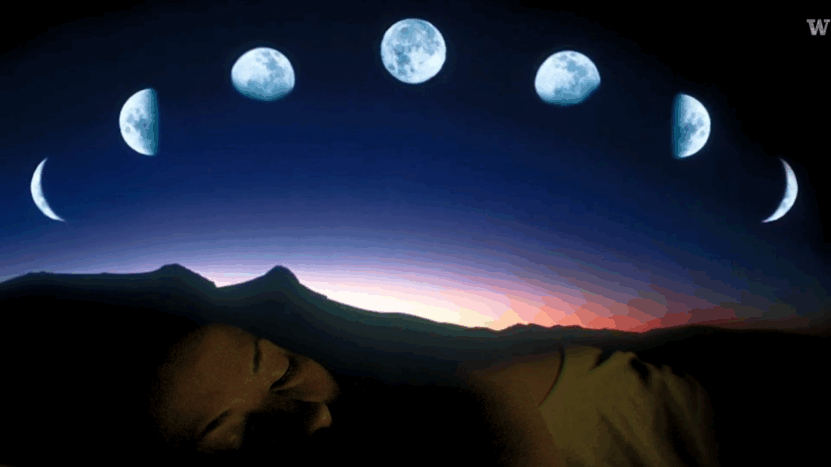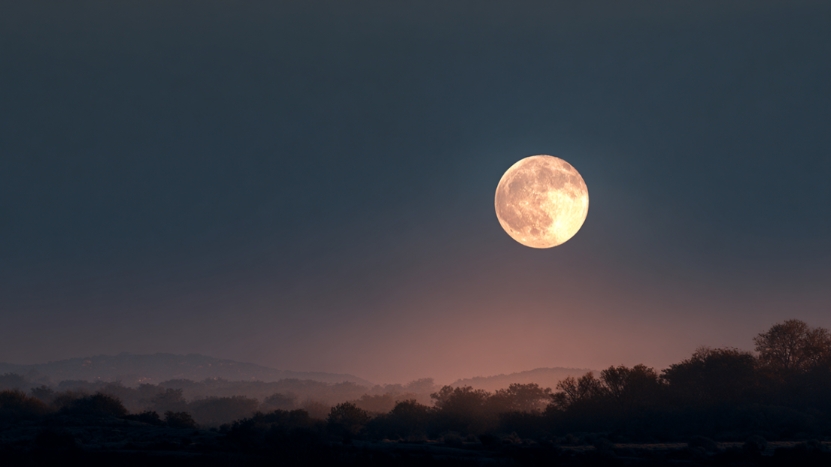Scientific studies show that the Moon does have a measurable but subtle influence on human sleep, especially around the full moon.
While ancient beliefs about lunar phases causing insomnia may sound superstitious, modern research supports the idea that people tend to sleep slightly worse during a full moon—experiencing less deep sleep, reduced total sleep duration, and taking longer to fall asleep.
However, the effect is not drastic, and not everyone is equally sensitive. It’s not astrology—it’s biology, light, and possibly evolutionary remnants of our ancestors’ sleep cycles.
In one landmark study by Cajochen et al. (2013), participants took an average of 5 minutes longer to fall asleep, slept 20 minutes less overall, and showed 30% less deep sleep (slow-wave sleep) during the full moon phase—even when they were in a completely dark room with no visible moonlight.
Other studies have reported similar findings, although some show conflicting results, suggesting that the moon’s effects vary by individual, gender, and environmental context.
What Exactly Changes in Sleep During a Full Moon?

The most consistent findings across research are:
- Increased sleep latency: People take longer to fall asleep (5–15 minutes longer on average).
- Reduced total sleep time: Full moon nights often result in 10–25 minutes less sleep.
- Less deep sleep: EEG studies show reduced slow-wave activity, associated with physical recovery.
- Changes in melatonin secretion: Some research indicates suppressed melatonin levels during the full moon, which can impact circadian rhythm.
These changes are often subtle—not as dramatic as folklore would suggest—but statistically significant in controlled environments.
Biological Effects of Moonlight vs. Full Moon Timing
Biological Process
Potential Impact
Explanation
Melatonin suppression
Mild to moderate
Even indirect moonlight may reduce melatonin levels, delaying sleep onset
Circadian rhythm disruption
Slight
Full moon brightness may shift internal clocks if exposed
Sleep architecture
Less deep sleep
EEG data shows lower delta wave activity during full moons
REM sleep duration
Inconsistent results
Some studies report less REM, others no effect
Does Moonlight Really Matter if You’re Indoors?
One common myth is that the moon’s brightness itself is what disrupts sleep. This is partly true—moonlight can affect melatonin levels, just like artificial light.
A full moon emits about 0.25 lux, which is roughly 500 times dimmer than a 60-watt light bulb but still perceptible in rural or dark suburban environments.
However, many lab-based studies show sleep disruption completely eliminates exposure to moonlight, indicating the moon’s impact might be tied more to internal biological rhythms than just light exposure.
So while blocking moonlight with blackout curtains can help some people, the effect might persist for those who are more circadian-sensitive.
Are Some People More Sensitive to the Moon?
Yes. Research suggests individual variability based on:
- Gender: Some studies (e.g., Wehr et al.) suggest women are more sensitive to lunar rhythms, potentially due to hormonal cycles.
- Chronotype: Night owls may be more affected than morning types.
- Geography: Urban dwellers with more artificial light exposure may experience weaker moon effects.
- Mental health: Individuals with bipolar disorder or anxiety may notice greater sensitivity to lunar changes.
Who Is Most Likely to Feel the Effects?
Factor
Effect Level
Notes
Women
Moderate
Some hormonal links observed
Children
Low to moderate
Slight reduction in sleep time reported
Adults with mood disorders
High
Greater sleep disruption in bipolar patients
Urban residents
Low
Moonlight often overpowered by city lights
Rural residents
Moderate
Darker environments make moonlight more noticeable
What About Lunar Myths?
Many traditional cultures blamed the full moon for insomnia, seizures, or madness (the term “lunatic” literally comes from luna, Latin for moon).
While these beliefs are not backed by hard science, they reflect a real human tendency to associate lunar changes with emotional or behavioral shifts.
That said, no credible study supports the idea that full moons cause aggression, violence, or psychiatric emergencies in a direct way.
However, poor sleep caused by the full moon might indirectly influence mood, irritability, or decision-making in the short term.
Does the Moon’s Gravitational Pull Affect Sleep?
View this post on Instagram
Another common idea is that the moon’s gravitational pull affects our bodies like it affects tides. But this is scientifically unsupported.
The moon does influence ocean tides due to the massive volume of water. But the gravitational difference across the human body (which is tiny in comparison) is negligible.
There is no evidence that gravitational forces from the moon alter biological processes like sleep directly.
Can You Protect Your Sleep From Lunar Effects?
If you’re someone who struggles with sleep around full moons, there are practical strategies to minimize the effect:
- Use blackout curtains: Block out both moonlight and streetlights.
- Avoid screens before bed: Artificial blue light is a much stronger disruptor than moonlight.
- Stick to a consistent bedtime: Circadian stability helps buffer any lunar disturbance.
- Track your sleep: Use a sleep diary or wearable to see if lunar cycles correlate with your own sleep quality.
- Limit caffeine and alcohol: Both worsen sensitivity to light and disrupt melatonin production.
Simple Ways to Improve Sleep During Full Moons
Strategy
Why It Helps
How to Implement
Blackout curtains
Blocks light cues
Install in bedrooms facing moonrise
Sleep hygiene
Strengthens circadian rhythm
Consistent sleep/wake times, calming bedtime routine
Limit light exposure
Protects melatonin
No screens 1 hour before bed
Relaxation techniques
Reduces anxiety about sleep
Breathing, meditation, or journaling
Use of a sleep mask
Blocks ambient light
Especially useful for side sleepers
Final Word

The idea that the moon affects sleep is not just a myth—but it’s also not a dramatic influence for most people.
The full moon seems to modestly reduce deep sleep and delay sleep onset, possibly due to a combination of subtle light cues and our brain’s internal lunar rhythm.
Sleep habits influence your skin’s elasticity, making consistent rest important not only for how you feel but also how you look.
So if you’re tossing and turning around the full moon, it’s not your imagination. But it’s also not fate.
Sleep hygiene and awareness go a long way in reducing the moon’s impact, especially in modern light-saturated environments.

